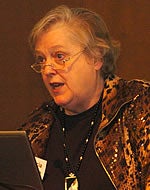Women face challenges in academics, research, surgeon says

Dr. Patricia Numann
GREENVILLE, N.C. (Apr. 6, 2010) — Dr. Patricia Numann – renowned surgeon, academic leader – is proof women have accomplished much in medicine and medical research.
But even in 2010, old stereotypes and behaviors are still pervasive enough to create disadvantages for women, she said.
Speaking Wednesday, March 31, at the annual Women in Science and Medicine Conference at the East Carolina Heart Institute at East Carolina University, Numann related the story of a medical resident at her school who’s faced obstacles in her career due to a senior male faculty member’s unwanted advances.
“If you think it doesn’t happen today, it happened today in Syracuse, and it could happen at Brody,” Numann said.
Numann is professor of surgery and distinguished service professor at the State University of New York Upstate Medical University in Syracuse and a breast and thyroid surgeon at Upstate’s University Hospital. Forty years ago, when Numann graduated from medical school at SUNY Upstate, fewer than 1 percent of surgical residents were women. That did not dissuade her from becoming an inaugurator of firsts, locally and nationally. She became the first woman surgeon and medical director at SUNY Upstate, the first woman vice president of the American College of Surgeons and the first woman to serve on the American Medical Association’s Council on Scientific Affairs, among other accomplishments.
It was at a 1981 meeting of the ACS that she founded the American Association of Women Surgeons by inviting every woman surgeon she could identify to a breakfast. Sharing experiences and concerns, the group decided to meet annually.
Citing numerous studies and surveys, Numann elaborated on some of those concerns about not only women in medicine but also women in academic and professional life in general. For example, women earn 77 cents for every dollar men earn for doing the same work. While women now make up half of enrolled medical students, only 20 percent of full professors at medical schools are women. Women faculty members report isolation, a lack of mentors, unclear rules for advancement and a lack of research support, among other obstacles, Numann said.
She said men often mistakenly say women “just aren’t interested” in taking on greater responsibilities and advancing professionally.
“When you ask (women), they do want these things and they want them as much as men do,” Numann said.
She said she herself has been guilty of writing recommendation letters for women students that praised them for their compassion and teaching skills rather than emphasizing their accomplishments – as is often done in letters for men. Studies show these patterns are widespread. Numann said she makes a point now of highlighting women’s academic and research accomplishments.
Among other goals to improve the work environment and opportunities for women, Numann encouraged women to create their own community of support in their professional lives.
“Women add a new dimension, a different dimension, and it’s important to have that dimension in our society,” she said.